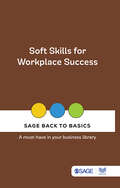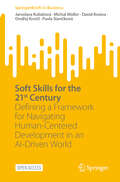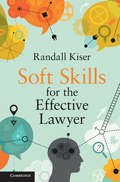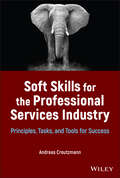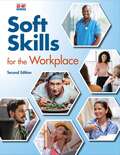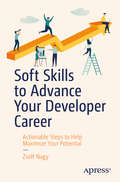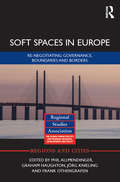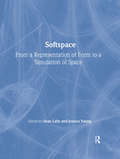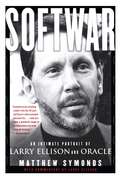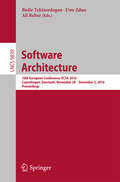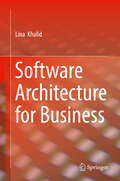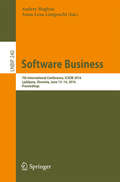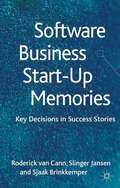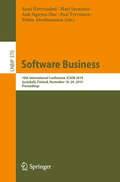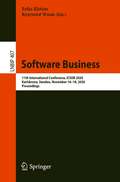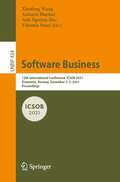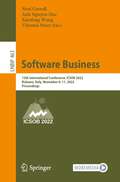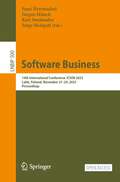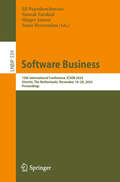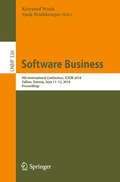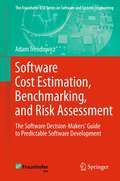- Table View
- List View
Soft Skills for Workplace Success (SAGE Back to Basics)
by SAGE Publications India Pvt. LtdFrom the ninjas of corporate world comes a curated recipe book on how to be happy and content in our professional lives. Soft skills for Workplace helps us in dodging the derailers such as ego and stress that can negatively impact our behaviour, and replacing them instead with humour and emotional intelligence as tools to find joy at the workplace. SAGE Back to Basics is a distilled compilation of proven and timeless ideas and best practices for new-age and experienced leaders alike. The hand-picked collection of books—on management, leadership, entrepreneurship, branding and CSR—offer advice from management experts whose knowledge and research has impacted and shaped business and management education. Other books in the series: Timeless Leadership | Advertising and Branding Basics | Leadership Lessons from Dr Pritam Singh | Corporate Social Responsibility in India | Basics of Entrepreneurship | Human Resource Development Insights | Ideate, Brainstorm, Create | Building Professional Competencies | Timeless Management
Soft Skills for the 21st Century: Defining a Framework for Navigating Human-Centered Development in an AI-Driven World (SpringerBriefs in Business)
by Pavla Slavíčková Jaroslava Kubátová Michal Müller David Kosina Ondřej KročilIn this open access book, the authors embark on a ground breaking exploration of the often-elusive realm of soft skills, addressing the challenges posed by technology and the evolving workplace. With well-founded research, the book navigates the complex landscape of academic and non-academic perceptions, offering a critical analysis of the evolving definitions and classifications of soft skills. The heart of the book lies in the Delphi research methodology that helps uncover 30 key soft skills for the 21st century. The subsequent chapters redefine, categorize, and model these skills, introducing rubrics and a tree model that showcases their interconnected nature. This structured approach provides educators, trainers, and professionals with a comprehensive framework for understanding and developing soft skills tailored to the demands of the modern world. As the book concludes, it emphasizes the enduring importance of soft skills in the face of technological advances, offering a vital resource for educators, trainers, professionals, and policymakers seeking to foster ethical decision-making and effective relationships in today's dynamic landscape.
Soft Skills for the Effective Lawyer
by Randall KiserIn this groundbreaking book, Randall Kiser presents a multi-disciplinary, practice-based introduction to the major soft skills for lawyers: self-awareness, self-development, social proficiency, wisdom, leadership, and professionalism. The work serves as both a map and a vehicle for developing the skills essential to self-knowledge and fulfillment, organizational respect and accomplishment, client satisfaction and appreciation, and professional improvement and distinction. It identifies the most important soft skills for attorneys, describes and applies hundreds of studies regarding psychology, law, and soft skills, and provides concrete steps and methods to improve soft skills. The book should be read by law students, attorneys, and anyone else interested in how lawyers should practice law.
Soft Skills for the Professional Services Industry: Principles, Tasks, and Tools for Success
by Andreas CreutzmannSoft Skills for the Professional Services Industry Auditors, accountants, lawyers, consultants, and other highly educated and trained professionals frequently hold impressive credentials and offer clients specialized expertise in complex areas. At the same time, these professionals understandably focus on the analytical and technical components of their jobs, sometimes to the point of excluding or ignoring important soft skills critical to the success of their careers and practices. In Soft Skills for the Professional Services Industry: Principles, Tasks, and Tools for Success, veteran auditor and entrepreneur Andreas Creutzmann delivers an essential discussion of often overlooked professional competencies that can mean the difference between career, engagement, and business success or failure. In the book, you’ll find accessible guidance on critical soft skills that can make a difference between fulfilment and success and failure on a professional and personal level. You’ll learn to handle the blending of home and the home office, how to effectively manage staff, how to market yourself and your firm, practical strategies for client and colleague communication, and how to find happiness in your day-to-day work. Each chapter stands alone and can be read in any order. They provide professionals with invaluable skills for navigating the modern—and digital—reality of work, showing you how to combine your professional education with the latest research and common sense on everything from client management to firm marketing. Soft Skills for the Professional Services Industry uses the field of auditing as a template and guide, but it is highly relevant to all skilled professionals – including lawyers, consultants, medical professionals, and others. The book is a must-read for any knowledge worker trying to add to their toolbox of practical skills. Critical guidance for practicing professionals on how to build often overlooked soft skills Most highly educated and trained professionals aren’t lacking in analytical or technical skills. Lawyers know the law, accountants understand double entry bookkeeping, and doctors know anatomy. However, many of us are less familiar with often overlooked—and equally essential—soft skills: client management, communication, staff and employee management, and others. In Soft Skills for the Professional Services Industry, accomplished auditor, entrepreneur, and consultant Andreas Creutzmann walks you through how to build critical competencies, from self-marketing to balancing work and life when your office is in your house. The book is made up of numerous, self-contained chapters that can be read in any order, and it demonstrates how to navigate increasingly digital and insistent professional demands on your time, effectively manage client and colleague relationships, and sell new clients on the services your firm offers. An essential roadmap to achieving personal and career success, Soft Skills for the Professional Services Industry is an indispensable resource for lawyers, doctors, accountants, auditors, and any other extensively skilled professional. It offers practical tools in functional areas that are frequently neglected in formal professional training.
Soft Skills for the Workplace
bySoft Skills for the Workplace is a nontraditional approach to learning basic employability skills needed in today's workplace. Well-developed soft skills help an individual find a job, perform well in the workplace, and gain personal success in life and career. By studying this text, you will learn the soft skills that employers recommend, and require, of employees. Learning how to interact professionally with customers, coworkers, and employers is one sure way to prepare for your future. In today's workplace, it is necessary to have job-specific skills to perform on the job as well as know-how to interact with coworkers and customers. You may be the most qualified person in your field in terms of hard skills, but if you lack soft skills, you may have a challenge finding and retaining employment. No matter your career choice, Soft Skills for the Workplace will help you help you jump-start your future. In today's competitive work environment, well-developed employability skills can help you stand out in the crowd Soft skills are the new hard skills for the 21st century.
Soft Skills to Advance Your Developer Career: Actionable Steps to Help Maximize Your Potential
by Zsolt NagyAs a software developer, your technical skill set is in high demand. Devices and technology have become an integral part of our everyday lives and no digital organization can thrive without technical professionals on the payroll. However, career plateaus are inevitable in even the most high-demand field. Companies do not only need software developers; they need software developers with soft skills.In Soft Skills to Advance Your Developer Career, author Zsolt Nagy explores how emotional intelligence can give your software development career an edge. These subjects are not taught in school, and unfortunately the career advancement of many excellent developers can be blocked by their inability to effectively communicate their needs, assert themselves, and negotiate confidently. Throughout this book, Nagy shows you how to actively improve and prioritize your soft skills so that you can better represent the holistic interests of your team, obtain better working conditions, negotiate raises, and increase your variety of employment options by elevating your interviewing skills.Discover the obstacles standing between you and a fulfilling career by finding and improving strengths you may not have even known you had. Jump out of your box with Soft Skills to Advance Your Developer Career and leverage your expertise with effortless confidence at all stages of your professional journey.What You Will LearnExamine why software developer careers cannot be treated similarly as any other career pathUnderstand the four soft-skills you need to advance your careerDevelop a strategy for your personal brand and align it with your career planRealize the role of assertive communication, and the importance of giving and receiving feedbackCreate a plan for setting yourself up for a raise or promotionDiscover techniques for acing the behavioral and coding interview Who This Book Is ForSoftware developers who have the technical skills required for career advancement, but want a guide on how to manage their careers
Soft Spaces in Europe: Re-negotiating governance, boundaries and borders (Regions and Cities)
by Jörg Knieling Graham Haughton Frank Othengrafen Phil AllmendingerThe past thirty years have seen a proliferation of new forms of territorial governance that have come to co-exist with, and complement, formal territorial spaces of government. These governance experiments have resulted in the creation of soft spaces, new geographies with blurred boundaries that eschew existing political-territorial boundaries of elected tiers of government. The emergence of new, non-statutory or informal spaces can be found at multiple levels across Europe, in a variety of circumstances, and with diverse aims and rationales. This book moves beyond theory to examine the practice of soft spaces. It employs an empirical approach to better understand the various practices and rationalities of soft spaces and how they manifest themselves in different planning contexts. By looking at the effects of new forms of spatial governance and the role of spatial planning in North-western Europe, this book analyses discursive changes in planning policies in selected metropolitan areas and cross-border regions. The result is an exploration of how these processes influence the emergence of soft spaces, governance arrangements and the role of statutory planning in different contexts. This book provides a deeper understanding of space and place, territorial governance and network governance.
Soft Target Protection: Theoretical Basis and Practical Measures (NATO Science for Peace and Security Series C: Environmental Security)
by Ladislav Hofreiter Viacheslav Berezutskyi Lucia Figuli Zuzana ZvakováThis proceedings volume includes articles presented during the Advanced Research Workshop on Soft Target Protection. The book presents important topics related to the protection of vulnerable objects and spaces, called Soft Targets. The chapters published in this book are thematically assigned to the blocks as follows: Theoretical aspect of soft target protection; Blast resistance of soft targets; Counter terrorism; Technical and technological solutions for soft target protection; Scheme and organizational measures; Blast protection and Forces for soft target protection. In this book, the reader will find a wealth of information about the theoretical background for designing protection of soft targets, as well as the specifics of protecting objects in armed conflict areas. New methods and procedures applicable to the soft target protection are described.
Softly, As I Leave You: The long-awaited memoir about life behind the walls of Graceland from Priscilla, wife of a legend
by Priscilla PresleyThe long-awaited, candid memoir by Priscilla Presley chronicling her difficult, inspiring journey beyond the walls of Graceland and behind the elegant image the world sees. The Elvis legacy seen from the inside ...Priscilla Presley's divorce from Elvis left his fans incredulous. How could she leave the man every woman wanted? From the outside, life in Elvis's mansion looked glamorous and enviable, and in many respects, it was. But inside the mansion, her husband was constantly surrounded by a male entourage while at the gates, lines of beautiful women waited hopefully for an audience with the King. From the time she was seventeen years old, that life was all Priscilla had known. During her ten years with Elvis, it became painfully apparent that she had no idea who she was outside Elvis's world. The only way to find herself was to leave that world and seek a new life of her own, because leaving was the only way to survive, for herself and for her daughter.Softly, As I Leave You, is the deeply personal story of what Priscilla lost and what she found when she walked away from the man she loved. Despite the legal separation, their love for one another transformed into a touching and tender dynamic that endured until Elvis's untimely death four years later. Shattered by Elvis's passing, she had to reinvent herself a second time as the single mother of a talented, often headstrong daughter who never really recovered from her father's death. Priscilla's dedication to motherhood was enriched by the birth of her second child, and she gradually found her footing as a businesswoman, actress, designer, and legislative advocate. She transformed Graceland into an international destination and helped guide the development of Elvis Presley Enterprises. But the unexpected, shattering loss of three immediate family members years later brought Priscilla to her knees. She shares her journey with a quiet dignity that will comfort and reassure anyone who has suffered - and survived - seemingly unbearable loss.A passionate, compassionate, and inspiring story of finding your place in the world, Softly, As I Leave You, is a sweet Southern melody that will take the reader with Priscilla on her long road home.
Softly, As I Leave You: The long-awaited memoir about life behind the walls of Graceland from Priscilla, wife of a legend
by Priscilla PresleyThe long-awaited, candid memoir by Priscilla Presley chronicling her difficult, inspiring journey beyond the walls of Graceland and behind the elegant image the world sees. The Elvis legacy seen from the inside ...Priscilla Presley's divorce from Elvis left his fans incredulous. How could she leave the man every woman wanted? From the outside, life in Elvis's mansion looked glamorous and enviable, and in many respects, it was. But inside the mansion, her husband was constantly surrounded by a male entourage while at the gates, lines of beautiful women waited hopefully for an audience with the King. From the time she was seventeen years old, that life was all Priscilla had known. During her ten years with Elvis, it became painfully apparent that she had no idea who she was outside Elvis's world. The only way to find herself was to leave that world and seek a new life of her own, because leaving was the only way to survive, for herself and for her daughter.Softly, As I Leave You, is the deeply personal story of what Priscilla lost and what she found when she walked away from the man she loved. Despite the legal separation, their love for one another transformed into a touching and tender dynamic that endured until Elvis's untimely death four years later. Shattered by Elvis's passing, she had to reinvent herself a second time as the single mother of a talented, often headstrong daughter who never really recovered from her father's death. Priscilla's dedication to motherhood was enriched by the birth of her second child, and she gradually found her footing as a businesswoman, actress, designer, and legislative advocate. She transformed Graceland into an international destination and helped guide the development of Elvis Presley Enterprises. But the unexpected, shattering loss of three immediate family members years later brought Priscilla to her knees. She shares her journey with a quiet dignity that will comfort and reassure anyone who has suffered - and survived - seemingly unbearable loss.A passionate, compassionate, and inspiring story of finding your place in the world, Softly, As I Leave You, is a sweet Southern melody that will take the reader with Priscilla on her long road home.
Softspace: From a Representation of Form to a Simulation of Space
by Sean Lally; Jessica YoungThis well-illustrated book unites essayists and emerging architectural practices to examine how digital tools are increasingly being used in architectural design, not only to show form, structure and geometries but also to visualize and simulate energies and material qualities such as air, gas, sound, scent and electricity. Softspace takes stock of current advancements in design and research, while drawing on historical and ideological trajectories rooted in the past fifty years. The varied contributors examine the capabilities of such 'energy matters' to act as catalysts for design innovation today. This well-presented and impressively authored title will provoke architects of all levels to consider the potential for creative and innovative design through the use of digital design tools.
Softwar: An Intimate Portrait of Larry Ellison and Oracle
by Matthew SymondsIn a business where great risks, huge fortunes, and even bigger egos are common, Larry Ellison stands out as one of the most outspoken, driven, and daring leaders of the software industry. The company he cofounded and runs, Oracle, is the number one business software company: perhaps even more than Microsoft's, Oracle's products are essential to today's networked world.But Oracle is as controversial as it is influential, as feared as it is revered, thanks in large part to Larry Ellison. Though Oracle is one of the world's most valuable and profitable companies, Ellison is not afraid to suddenly change course and reinvent Oracle in the pursuit of new and ever more ambitious goals. Softwar examines the results of these shifts in strategy and the forces that drive Ellison relentlessly on.In Softwar, journalist Matthew Symonds gives readers an exclusive and intimate insight into both Oracle and the man who made it and runs it. As well as relating the story of Oracle's often bumpy path to industry dominance, Symonds deals with the private side of Ellison's life. From Ellison's troubled upbringing by adoptive parents and his lifelong search for emotional security to the challenges and opportunities that have come with unimaginable wealth, Softwar gets inside the skin of a fascinating and complicated human being. With unlimited insider access granted by Ellison himself, Symonds captures the intensity and, some would say, the recklessness that have made Ellison a legend.The result of more than a hundred hours of interviews and many months spent with Ellison, Softwar is the most complete portrait undertaken of the man and his empire -- a unique and gripping account of both the way the computing industry really works and an extraordinary life.Despite his closeness to Ellison, Matthew Symonds is a candid and at times highly critical observer. And in perhaps the book's most unusual feature, Ellison responds to Symonds's portrayal in the form of a running footnoted commentary.The result is one of the most fascinating business stories of all time.
Software Architecture
by Uwe Zdun Bedir Tekinerdogan Ali BabarA software architecture manifests the major early design decisions, which determine the system's development, deployment and evolution. Thus, making better architectural decisions is one of the large challenges in software engineering. Software architecture knowledge management is about capturing practical experience and translating it into generalized architectural knowledge, and using this knowledge in the communication with stakeholders during all phases of the software lifecycle. This book presents a concise description of knowledge management in the software architecture discipline. It explains the importance of sound knowledge management practices for improving software architecture processes and products, and makes clear the role of knowledge management in software architecture and software development processes. It presents many approaches that are in use in software companies today, approaches that have been used in other domains, and approaches under development in academia. After an initial introduction by the editors, the contributions are grouped in three parts on "Architecture Knowledge Management", "Strategies and Approaches for Managing Architectural Knowledge", and "Tools and Techniques for Managing Architectural Knowledge". The presentation aims at information technology and software engineering professionals, in particular software architects and software architecture researchers. For the industrial audience, the book gives a broad and concise understanding of the importance of knowledge management for improving software architecture process and building capabilities in designing and evaluating better architectures for their mission- and business-critical systems. For researchers, the book will help to understand the applications of various knowledge management approaches in an industrial setting and to identify research challenges and opportunities.
Software Architecture for Business
by Lina KhalidThis book illustrates the role of software architecture and its application in business. The author describes enterprise architecture along with business architecture to show the role of software architecture in both areas. The place of software architecture in business is outlined from many perspectives in this context. The book outlines quality attributes and how managers can use software architecture to build high quality products. Topics include business software architecture, dealing with qualities, achieving quality attributes, managing business qualities, software product line, Internet of Things (IOT), and Service Oriented Business Architecture. The book is intended to benefit students, researchers, software architects, and business architects. Provides quick and easy access to all the important aspects of software architecture in business;Highlights a wide variety of concepts of software architecture in a straightforward manner, for students, practitioners, or architects;Presents different applications of software architecture in business.
Software Associates
by Robert S. KaplanThe president of a small consulting firm has just seen his second-quarter profit and loss statement, showing an increase in revenues but a substantial decline in profits. He asks his chief financial officer to explain the results. The CFO works hard to accumulate information to explain the impact of the quantity of billed hours, billing rates, consultant expenses, operating expenses, and the shifting mix of business between the two principal product lines.
Software Business
by Andrey Maglyas Anna-Lena LamprechtThis book contains the refereed proceedings of the 7th International Conference on Software Business, ICSOB 2016, held in Ljubljana, Slovenia, in June 2016. Software business refers to commercial activities in and around the software industry aimed at generating income from the delivery of software products and services. The theme of the event was "Software as a New Way of Providing Cutting-edge Solutions". The 10 full and 5 short papers for ICSOB were selected from 38 submissions. The papers span a wide range of issues related to contemporary software business, ranging from strategic aspects to operational challenges. The strong presence of software ecosystem papers confirms the importance of this topic and influence on software business. In addition, a short abstract of the key note by Peter Lick and Hans-Bernd Kittlaus is also included.
Software Business Start-up Memories
by Sjaak Brinkkemper Slinger Jansen Roderick Van CannDescribes the decisions that led to the success of 16 software companies. The decisions are illustrated in detail, providing entrepreneurs with insights into what it takes to make a decision that can change the future of a company.
Software Business: 10th International Conference, ICSOB 2019, Jyväskylä, Finland, November 18–20, 2019, Proceedings (Lecture Notes in Business Information Processing #370)
by Pasi Tyrväinen Pekka Abrahamsson Sami Hyrynsalmi Mari Suoranta Anh Nguyen-DucThis book constitutes the refereed proceedings of the 10th International Conference on Software Business, ICSOB 2019, held in Jyväskylä, Finland, in November 2019. On the occasion of its tenth anniversary the conference theme this year was “The First Decade and Beyond” and focused on the development during the past decade, addressing the future of software-intensive business as well as studies on new and emerging ideas. The 18 full papers and 10 short papers presented together with 3 invited talks, 6 emerging research papers and a tutorial were carefully reviewed and selected from 52 submissions. They are organized in the following topical sections: software ecosystems; management of software products; continual improvement and product development; impacts of digitalization; software business education; software startups and digital business.
Software Business: 11th International Conference, ICSOB 2020, Karlskrona, Sweden, November 16–18, 2020, Proceedings (Lecture Notes in Business Information Processing #407)
by Krzysztof Wnuk Eriks KlotinsThis book constitutes the refereed proceedings of the 11th International Conference on Software Business, ICSOB 2020, which was held during November 16-18, 2020. The conference was originally planned to take place in Karlskrona, Sweden, but changed to an online format due to the COVID-19 pandemic. The 13 full papers and 5 short papers presented were carefully reviewed and selected from 39 submissions. They deal with a range of topics including practices for engineering and marketing software-intensive products, extracting business value from machine learning based software components, ethical considerations of the software business, software ecosystems, and pedagogy of teaching entrepreneurship and software business.
Software Business: 12th International Conference, ICSOB 2021, Drammen, Norway, December 2–3, 2021, Proceedings (Lecture Notes in Business Information Processing #434)
by Xiaofeng Wang Anh Nguyen-Duc Viktoria Stray Antonio MartiniThis book constitutes the refereed proceedings of the 12th International Conference on Software Business, ICSOB 2021, which was held during December 2-3, 2021. The conference was originally planned to take place in Drammen, Norway, but changed to an online format due to the COVID-19 pandemic. The special theme of ICSOB 2021 was software sustainability. The 13 full papers and 5 short papers presented were carefully reviewed and selected from 39 submissions. They deal with a range of topics including software sustainability, Agile development, DevOps, software startups, prototyping, software ecosystems, crowdsourcing platforms, technical debts, and risk management.
Software Business: 13th International Conference, ICSOB 2022, Bolzano, Italy, November 8–11, 2022, Proceedings (Lecture Notes in Business Information Processing #463)
by Noel Carroll Xiaofeng Wang Anh Nguyen-Duc Viktoria StrayThis book constitutes the refereed proceedings of the 13th International Conference on Software Business, ICSOB 2022, which was held during November 8-11, 2022 in Bolzano, Italy. The special theme of ICSOB 2022 was “Software for Digital Transformation”. The 19 full papers together with 6 short papers presented were carefully reviewed and selected from 53 submissions. The conference is covering different aspects of Digital Transformation, Software Startups, Software Ecosystems, Software Processes, Platform Economy, Software Sustainability, and People and Process Analytics.
Software Business: 14th International Conference, ICSOB 2023, Lahti, Finland, November 27–29, 2023, Proceedings (Lecture Notes in Business Information Processing #500)
by Jürgen Münch Kari Smolander Sami Hyrynsalmi Jorge MelegatiThis open access book constitutes the refereed proceedings of the 23rd International Conference on Software Business, ICSOB 2023, which was held in Lahti, Finland, during November 27–29, 2023. The special theme of ICSOB 2023 was Digital Agility: Mastering Change in Software Business and Digital Services.The 27 full papers and 8 short papers presented in this book were carefully reviewed and selected from 79 submissions. They were organized in topical sections as follows: Requirements; software procurement; platforms, ecosystems and data; artificial intelligence; software startups; software product management; software and business co-development; and emerging digital world.
Software Business: 15th International Conference, ICSOB 2024, Utrecht, The Netherlands, November 18–20, 2024, Proceedings (Lecture Notes in Business Information Processing #539)
by Slinger Jansen Efi Papatheocharous Siamak Farshidi Sonja HyrynsalmiThis book constitutes the refereed proceedings of the 15th International Conference on Software Business, ICSOB 2024, which took place in Utrecht, The Netherlands, during November 18-20, 2024. The special theme of ICSOB 2024 was Ethics, Equity, and Sustainability in Software Business. The 23 full papers and 13 short papers presented in this book were carefully reviewed and selected from 98 submissions. The papers are organized in the following topical sections: Ethical Challenges in Software Development; Developer Experience and Ecosystem Trust; Transparency and Trust in AI; Diversity and Inclusion in Software Business; Sustainable ICT; Experimentation and Innovations; Tools in Software Ecosystems; and Software Startups and Digital Transformation.
Software Business: 9th International Conference, ICSOB 2018, Tallinn, Estonia, June 11–12, 2018, Proceedings (Lecture Notes in Business Information Processing #336)
by Sjaak Brinkkemper Krzysztof WnukThis book constitutes the refereed proceedings of the 9th International Conference on Software Business, ICSOB 2018, held in Tallinn, Estonia, in June 2018. This year the conference theme was “How Digitalization Impacts Software Business” and focused on digitalization and its impact on the speed of business models and business modeling and the realization of these business models. The 11 full papers and 1 short paper presented in this volume were carefully reviewed and selected from 34 submissions. They were organized in topical sections named: software ecosystems; software product management and business models; and software start-ups.
Software Cost Estimation, Benchmarking, and Risk Assessment
by Adam TrendowiczSoftware effort estimation is a key element of software project planning and management. Yet, in industrial practice, the important role of effort estimation is often underestimated and/or misunderstood. In this book, Adam Trendowicz presents the CoBRA method (an abbreviation for Cost Estimation, Benchmarking, and Risk Assessment) for estimating the effort required to successfully complete a software development project, which uniquely combines human judgment and measurement data in order to systematically create a custom-specific effort estimation model. CoBRA goes far beyond simply predicting the development effort; it supports project decision-makers in negotiating the project scope, managing project risks, benchmarking productivity, and directing improvement activities. To illustrate the method's practical use, the book reports several real-world cases where CoBRA was applied in various industrial contexts. These cases represent different estimation contexts in terms of software project environment, estimation objectives, and estimation constraints. This book is the result of a successful collaboration between the process management division of Fraunhofer IESE and many software companies in the field of software engineering technology transfer. It mainly addresses software practitioners who deal with planning and managing software development projects as part of their daily work, and is also of interest for students or courses specializing in software engineering or software project management.
